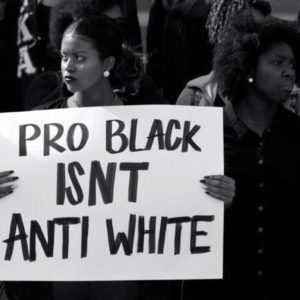Black…lives…matter. Hang on, simmer down, let’s think about this for a moment before you hit “send” on that email or click “reply” to this post with another hashtag to retort my claim. Have you ever stopped to actually think about the #BlackLivesMatter movement and what it truly means? If not, humor me for a moment as we really examine what this movement is communicating and combating.
According to their founders and leaders (Patrisse Cullers and Opal Tometi), #BlackLivesMatter does not mean that other lives do not matter. In fact, they have been very clear about this notion. The #BlackLivesMatter movement is simply asking the culture to remember that young black men in particular are flesh and blood, part of this great global community and beautiful diverse ecosystem.
It has been asked, “Why do they even need to say #BlackLivesMatter?” Critics of the movement like to respond to the saying with #AllLivesMatter or another specific hashtag that they think somehow lessens the statement. FYI: It does not. The reason the #BlackLivesMatter movement is so important is that America has never truly sought genuine reconciliation for its original sin of slavery, plus we simply ignore the current blatant institutional racism that persist in the country.
If you honestly think about this for a moment, you will begin to understand how this problem is overarching and demeaning. According to U.S. News and World Report, institutional racism is a way of the life in America, “It’s probably time to dust off some of the profound, disturbing statistics on institutional racism in America that have been painstakingly chronicled by groups like the Sentencing Project, the ACLU, American Psychological Association, the Education Department’s Civil Rights office and many others” (Institutional Racism Is Our Way of Life, Jeff Nesbit, May 6, 2015).
In his article, Nesbit cites numerous statutes to back this claim…
Black children make up 18 percent of the pre-school population, but represent almost half of the out-of-school suspicions.
During K through 12th, black children are three times more likely to be suspended than white children.
If black children find themselves before a judge, they are 18 times more likely to be sentenced as adults than white children, and make up nearly 60 percent of children in prisons.
After college, the jobless rate for blacks has been double that of whites for decades. A study even found that people with “black-sounding names” had to send out 50 percent more job applications than people with “white-sounding names” just to get a call back.
If black graduates get a job, for every $10,000 increase in pay, blacks’ percentages of holding that job falls by 7 percent compared to whites.
Institutional racism exist in neighborhoods and communities as well. About 73 percent of whites own homes, compared to just 43 percent of blacks. The gap between median household income for whites (about $91,000) compared to blacks (about $7,000) is staggering, and that gap has tripled in just the past 25 years. The median net worth of white families is about $265,000, while it was just $28,500 for blacks.
On the roads, a black man is three times more likely to be searched at a traffic stop, and six times more likely to go to jail than a white person. Blacks make up nearly 40 percent of arrests for violent crimes.
If a black person kills a white person, they are twice as likely to receive the death sentence as a white person who kills a black person. Local prosecutors are much more likely to upgrade a case to felony murder if you’re black than if you’re white.
Racial bias in jury selection is ridiculous – qualified black jurors are illegally turned away as much as 80 percent of the time in the jury selection process.
The result? About a quarter of juries in death penalty cases have no black jurors, and more than two-thirds have two or less. When a black person is accused of killing a white person – and the jury consists of five or more white males – the odds go way up for a death penalty verdict. Defense lawyers, and prosecutors, know that having just a single black man on the jury substantially changes the odds.
Black people stay in prison longer than white people – up to 20 percent longer than white people serving time for essentially similar crimes. They get much harsher sentences – black people are 38 percent more likely to be sentenced to death than white people for the same crimes.
And the color of the skin of the victims matters greatly in the punishment for capital crimes. Whites and blacks represent about half of murder victims from year to year, but 77 percent of people who are executed killed a white person, while only 13 percent of death row executions represent those who killed a black person.
Finally, if there is one glaring statistic that demonstrates our country’s overarching institutional racism, it is our prison system. Accord to the Bureau of Justice Statistics, people of color make up 30 percent of the U.S. population, but account for 60 percent of those imprisoned. More specifically, one in three black men can expect to go to prison in their lifetime. I know we don’t want to face this America, but that is blatant institutional racism right before our eyes.
Now, I understand this is a lot of information to absorb, but it demonstrates the reality we face. When I’m faced with such a problem, I always like to go to the Scriptures to find a response. In the Gospels, we find Jesus standing up for minorities and outcasts. We witness him embracing people different than himself, Samaritans and Romans. We see him engaging sinners and bringing hope to those who had none. We see him fighting an oppressive system that was leaving the poor and vulnerable behind.
In the end, Jesus lived out those words he cited before beginning his ministry, “The Spirit of the Lord is upon me, because he has anointed me to bring good news to the poor. He has sent me to proclaim release to the captives and recovery of sight to the blind, to let the oppressed go free, to proclaim the year of the Lord’s favor” (Luke 4:18-19, NRSV). If Jesus were standing in our pulpits today, I truly believe he would declare to his church, “Black…Lives…Matter!”

